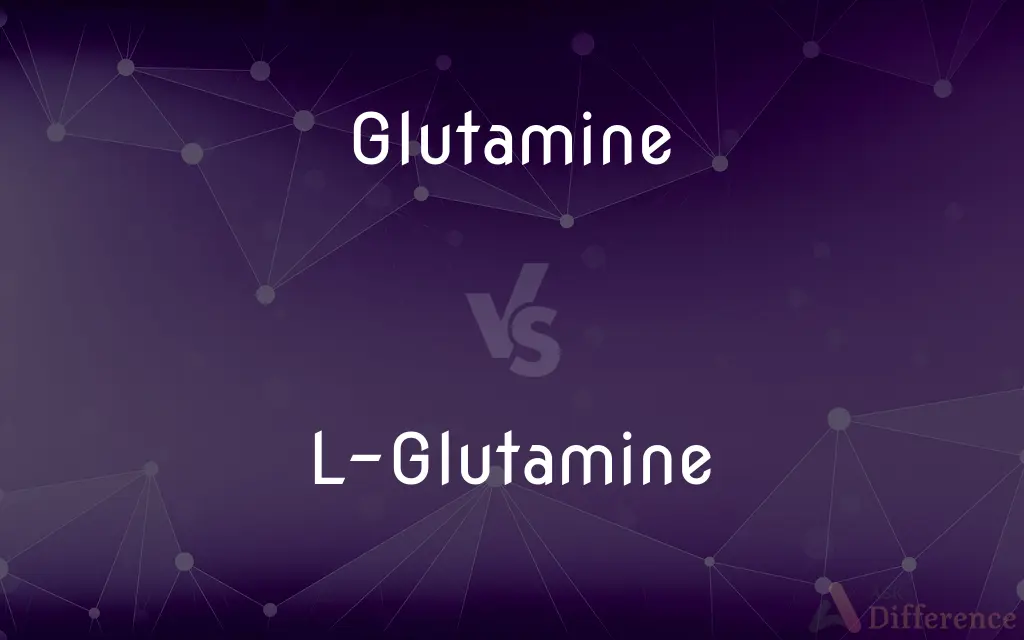Glutamine vs. L-Glutamine — What's the Difference?
By Tayyaba Rehman — Published on January 14, 2024
Glutamine is an amino acid important for various bodily functions. L-Glutamine is the biologically active form of glutamine, predominantly used in supplements and the human body.

Difference Between Glutamine and L-Glutamine
Table of Contents
ADVERTISEMENT
Key Differences
Glutamine is an amino acid that plays a crucial role in various metabolic processes in the body. It exists in two forms: L-Glutamine and D-Glutamine, which are mirror images of each other. L-Glutamine is the form that is biologically active in humans and is predominantly used in dietary supplements and medical treatments.
In the context of dietary supplements and physiology, when people refer to Glutamine, they are usually referring to L-Glutamine. This is because L-Glutamine is the form that the body can use effectively. D-Glutamine, while chemically similar, is not used by the body in the same way.
Glutamine is involved in a variety of functions, such as protein synthesis, providing fuel to cells, and supporting the immune and digestive systems. L-Glutamine, specifically, is the form that actively participates in these processes, making it essential for health and often supplemented for various medical conditions, including for gut health and immune support.
The term Glutamine in scientific and nutritional contexts often implicitly refers to L-Glutamine, due to its physiological significance. However, it is important to distinguish between the two when discussing chemical properties or when specific isomer forms are relevant, such as in scientific research.
In summary, while Glutamine represents the general amino acid, L-Glutamine specifies the biologically active form utilized in the human body and commonly found in supplements and medical treatments.
ADVERTISEMENT
Comparison Chart
Biological Activity
Includes both L-Glutamine and D-Glutamine forms.
Specifically refers to the biologically active form.
Usage in Supplements
Typically refers to L-Glutamine.
Predominantly used form in supplements.
Role in the Body
General term for the amino acid.
Directly involved in bodily functions.
Chemical Structure
Includes two isomers: L and D.
Refers to one specific isomer, L-Glutamine.
Relevance
Broader term for the amino acid.
More specific, often implied in nutrition and health.
Compare with Definitions
Glutamine
An amino acid important in protein synthesis and energy production.
Glutamine is a key nutrient in muscle repair and immune function.
L-Glutamine
Used in medical treatments for its healing properties.
L-Glutamine was part of his treatment plan for immune support.
Glutamine
Often used to refer to L-Glutamine in supplements.
The supplement bottle listed Glutamine as a primary ingredient.
L-Glutamine
Commonly found in dietary supplements and health products.
Her nutritionist suggested L-Glutamine supplements for gut health.
Glutamine
Exists in two forms, including L-Glutamine and D-Glutamine.
Both forms of Glutamine, L and D, have unique chemical structures.
L-Glutamine
Supports muscle growth and immune system function.
Athletes often take L-Glutamine for muscle recovery.
Glutamine
Supports various bodily functions, including immune response.
She increased her Glutamine intake to help with her digestive health.
L-Glutamine
The biologically active isomer of Glutamine used in the human body.
L-Glutamine plays a crucial role in maintaining intestinal health.
Glutamine
Essential for cellular energy and gut health.
Doctors recommended Glutamine to aid his recovery post-surgery.
L-Glutamine
Predominantly used form of Glutamine in nutrition and health.
Most research on Glutamine focuses on the L-Glutamine form.
Glutamine
A nonessential amino acid, C5H10N2O3, occurring widely in plant and animal tissue and proteins and produced commercially for use in medicine and biochemical research.
Glutamine
(amino acid) A nonessential amino acid C5H10N2O3 found in most animal and plant proteins.
Glutamine
A crystalline amino acid occurring in proteins; important in protein metabolism
Common Curiosities
Why is L-Glutamine important?
It supports immune function, gut health, and muscle repair.
What is Glutamine?
An amino acid important for various functions in the body.
Are Glutamine and L-Glutamine the same?
Generally, yes, but L-Glutamine specifically refers to the active form.
Can you get L-Glutamine from food?
Yes, it's found in meats, dairy, eggs, and certain vegetables.
What is D-Glutamine?
The mirror image of L-Glutamine, but not biologically active in humans.
Can Glutamine supplements help with digestive health?
Yes, they can support the lining of the gut and overall digestive health.
Are there side effects to taking L-Glutamine?
In normal doses, it's usually well-tolerated, but high doses may have side effects.
How is L-Glutamine used in medical treatments?
For gastrointestinal health, immune support, and in some cases, recovery from illness or injury.
What is L-Glutamine?
The biologically active form of Glutamine used in human physiology.
What does Glutamine do in the body?
It aids in protein synthesis, energy production, and supports the immune system.
Who might benefit from L-Glutamine supplements?
Athletes, people recovering from illness, or those with digestive issues.
How does L-Glutamine support the immune system?
It provides energy to immune cells and supports gut health, a key part of immunity.
Is L-Glutamine safe as a supplement?
Generally, it's considered safe but consult a healthcare provider for personal advice.
Should Glutamine supplements be taken with food?
It can be taken with or without food, but follow specific product recommendations.
Is L-Glutamine helpful for athletes?
Yes, for muscle recovery and energy supply during intense exercise.
Share Your Discovery

Previous Comparison
Somebody’s vs. Somebodies
Next Comparison
Antibiotics vs. VaccinesAuthor Spotlight
Written by
Tayyaba RehmanTayyaba Rehman is a distinguished writer, currently serving as a primary contributor to askdifference.com. As a researcher in semantics and etymology, Tayyaba's passion for the complexity of languages and their distinctions has found a perfect home on the platform. Tayyaba delves into the intricacies of language, distinguishing between commonly confused words and phrases, thereby providing clarity for readers worldwide.
















































